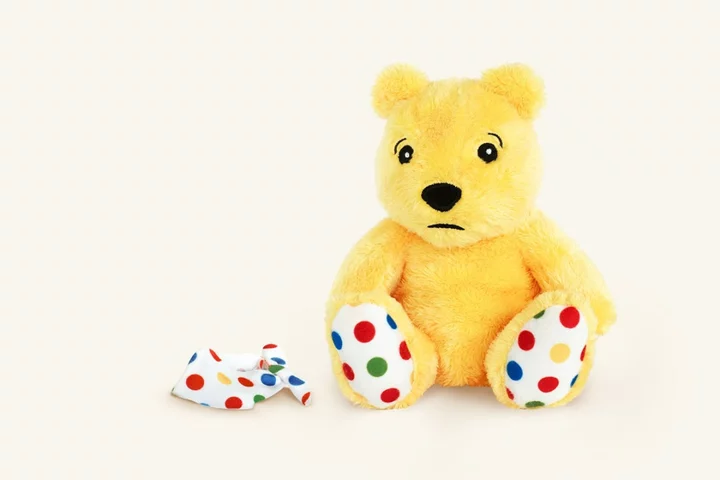
Indji Systems Launches Cutting-Edge Hail Detection Technology for the Solar Industry
LOS ANGELES--(BUSINESS WIRE)--May 15, 2023--
2023-05-15 18:19

The Weeknd is no more. The Canadian singer has reverted to his birth name on social media
The Weeknd is now officially known online by his real name -- Abel Makkonen Tesfaye -- after following through on plans to update his social media accounts.
2023-05-15 18:17

Fair access to proper housing can boost economic growth - report
By Marine Strauss BRUSSELS Providing equitable access to appropriate housing in slums and other informal settlements could massively
2023-05-15 18:16

How Bruce Willis almost missed out on 'uncastable' iconic role that kickstarted his career
'I didn't even know there was a Bruce Willis when I was writing it,' said show creator Glenn Gordon Caron
2023-05-15 17:58

Clara Pierce: TikTokers allegedly discover Miley Cyrus' unreleased album under pseudonym
Miley Cyrus, the popular singer, may have released another album secretly under the name 'Clara Pierce'
2023-05-15 17:52

Funds Sold as ‘Sustainable’ Hit by Crossborder Reality Check
Hardly any sustainable funds would consistently be able to market themselves as such in the UK, the US
2023-05-15 17:52

Scott Mills confirms Mel Giedroyc's NSFW Eurovision moment really happened with BTS clip
Scott Mills has confirmed that Mel Giedroyc's viral 'milk-churning' moment at Eurovision was actually real, by posting a behind-the-scenes clip of the action live from Liverpool. The Bake Off host set pulses racing with the suggestive move as she dressed up as a milkmaid - and no one could quite believe it was being shown on the BBC. Fans say the parody was in reference to Poland's raunchy 2014 submission to the Song Contest. Click here to sign up for our newsletters
2023-05-15 17:48

Answering Evolving Work Trends: Lenovo Unleashes Digital Workplace Solutions to Boost Employee Experience and Increase Productivity
RALEIGH, N.C.--(BUSINESS WIRE)--May 15, 2023--
2023-05-15 17:28

Children In Need removes Pudsey’s bandana to show not all challenges are visible
BBC Children In Need has launched a new Behind The Bandana campaign to mark Mental Health Awareness Week. The charity has temporarily removed mascot Pudsey’s eye covering to show “not all of the challenges that children and young people may be facing are visible”, the broadcaster said. The campaign encourages conversations between children and parents, carers and other trusted adults “to ensure no child faces their emotional and mental health challenges alone”. Former Love Island contestant Dr Alex George, who has campaigned for better mental health after the death of his 19-year-old brother Llyr by suicide in 2020, has been named Behind The Bandana ambassador. He said: “I know how important early intervention is in helping make a difference to the emotional wellbeing of children and young people and so I am very proud to be the ambassador of such a powerful campaign that really shines a light on the mental health crisis we are facing. “As highlighted by Pudsey bear himself, mental health issues can be less visible on the outside, but conversations and positive relationships really can help.” What’s also clear is that we can all play a role in addressing early signs of worry and anxiety by showing children and young people that we’re here to listen and to support them Simon Antrobus, Children In Need As part of the campaign, Children In Need has released the findings of a new Censuswide survey shedding light on how comfortable children feel when asking for help with their feelings and how often they feel the need to put on their “metaphorical bandana” and hide their emotions. While nine in 10 parents surveyed said they talk to their child about their mental health at least once a month, more than a quarter of young people surveyed said they had not talked to someone they trust about their mental health in the last six months. Children In Need’s boss Simon Antrobus said: “This research is a clear indication that our Behind The Bandana campaign is urgently needed. “What’s also clear is that we can all play a role in addressing early signs of worry and anxiety by showing children and young people that we’re here to listen and to support them. “By recognising and acknowledging that some feelings of worry and anxiety can be hidden means early conversations, sensitively delivered with kindness and empathy, can make a real difference to a child’s wellbeing and can help prevent mental health problems from becoming embedded.” Read More Charity boss speaks out over ‘traumatic’ encounter with royal aide Ukraine war’s heaviest fight rages in east - follow live
2023-05-15 17:21

KKR-backed Envision Healthcare files for bankruptcy
KKR & Co Inc-backed Envision Healthcare Corp filed for Chapter 11 bankruptcy on Monday, it said in a
2023-05-15 16:49

Is your child too anxious to go to school?
Like adults, it’s normal for kids to have wobbles and worries. But what happens when anxiety becomes an ongoing problem, causing a lot of distress and impacting school attendance? “It is natural for children to not want to go to school from time to time. For example, they might be worried about a test, or a problem with a friend,” says Dr Julia Clements, principal educational psychologist for children’s mental health charity, Place2Be. “With a bit of support, most children will be able to attend school regularly and to not avoid it when things get a bit tricky. However, other children may become so anxious that they start to avoid school all together.” Spotting the signs Remember, children often aren’t able to tell adults when they’re struggling with anxiety. Parents and carers can look out for signs, though. “Anxiety can show up differently in different children. Your child may become tearful or quiet at bedtime, for example, or report feeling so ill they cannot attend school. Alternatively, your child may appear quite angry, argumentative and refuse to get ready for school,” says Clements. Dr Marianne Trent, clinical psychologist and author of The Grief Collective, who previously worked in child and adolescent mental health services (CAMHS), adds: “A child may complain about not wanting to go to school, or that it is boring or that they have tummy ache. They may drag their heels more about leaving the house or walking to school.” Responding with care Showing that you are interested and care about how they’re feeling can be really helpful. Having your support could help alleviate their worries, and hopefully you’ll be able to work through some strategies together. “It is important that parents and carers acknowledge the distress their child is experiencing, and that they are finding going to school a real challenge,” says Clements. “For example, you might say something like, ‘I can see that you are really worried about going to school and that going in will be really hard for you’. “However, it is also important to help your child to ‘face their fears’ and to attend school, despite it being the last thing they feel like doing! Acknowledge that this might be tough, but that you believe in them and will support them to do this difficult thing. Praise and encourage your child for any small steps of progress they are able to make towards attending school regularly.” Trent suggests talking to them about what might have caused their sudden reluctance to attend school: “Asking how they’re feeling and if anything happened the day before which made them feel worried, sad or confused can be a useful first step.” It might be easy for parents and carers to get frustrated and possibly angry if children refuse to go to school. However, this could lead to more distress, so it’s helpful to try and communicate calmly. Trent says: “It’s worth knowing that anger is a secondary emotion, and that this might mask a feeling of not having control, sadness, or even parental anxiety too. “Trying to enter into conversations when both parties are feeling well rested can give the best chance of staying calm. It’s also important that repairing any ruptured relationships is modelled ideally as soon as possible after any harsh or loud words have been spoken,” she adds. Talk to the school If the pattern continues, Trent says: “Arranging a meeting to discuss with the school can be an important step forward. If school attendance drops below a certain percentage, then it may trigger a referral to Child and Adolescent Mental Health services (CAMHS) and/or social care. “If there is a pastoral department in school, then arranging for the child to spend time there doing some 1:1 or group work can be useful. Similarly, liaising with mental health and support services for therapy or support can be transformational too.” Your GP can help advise on mental health support, and some schools may also have counselling services in place. However, Clements says there may be various ways school staff can potentially help – simple adjustments that could make a big difference: “For example, your child may like to be met at the gate, or being given a special job to do in the morning.” Is there anything else going on? It’s important to consider whether other factors could be coming into play, which may require additional attention and support. Clements says: “Do make sure that your child is safe from harm at school – for example, their avoidance of school is not due to them being bullied. If your child is avoiding school because of their neurodivergence or additional needs, then liaise with the SENCO (special educational needs co-ordinator) to make sure that reasonable adjustments are being made.” Read More Charity boss speaks out over ‘traumatic’ encounter with royal aide Ukraine war’s heaviest fight rages in east - follow live Could talking to toddlers be the key to early brain development? What’s the link between the menopause and anxiety? How to encourage green-fingered kids
2023-05-15 16:26

Could talking to toddlers be the key to early brain development?
Talking to toddlers can help advance early brain development, scientists have found. Researchers from the University of East Anglia (UEA) discovered that two-and-a-half-year-olds who heard more speech in everyday life had more myelin – a substance that makes brain signals more efficient – in language-related areas of their brains. The researchers said their findings, published in the Journal of Neuroscience, demonstrate how talking to toddlers can shape their developing brain. Lead researcher Prof John Spencer, from UEA’s School of Psychology, said: “We know that children’s brains develop very rapidly in the first two years of life, with brain volume at about 80% that of an adult brain by the age of two. The message to caregivers is clear - talk to your baby, your toddler, your child. Not only are they listening, but your language input is literally shaping their brains Prof John Spencer “Myelin is made up of protein and fatty substances and forms an insulating layer around nerves in the brain.” He added: “Imagine you have a hosepipe with lots of holes in it. “Myelin is like wrapping the hosepipe with duct tape – it insulates neural fibres, bringing more of the ‘signal’ from one brain area to the next.” For the study, the researchers gave 163 babies and toddlers small recording devices to wear for three days. They analysed just over 6,000 hours of language data in total, which included words spoken by the children as well as speech from adults. When the children were asleep, the researchers carefully placed them in an MRI scanner to measure myelin in their brains. Prof Spencer said: “What we found is that the toddlers who heard more speech in their everyday environment also had more myelin, which is likely to support more sophisticated language processing. “In other words – talking to your kids is very important in early development as it helps to shape the brain.” The researchers said their study is one of the first to show that listening to speech is associated with brain structure early in development. Prof Spencer said: “Prior work showed a similar association in four to six-year-olds, but our findings push this association much earlier in development. “Indeed, we even found associations between language input and brain structure in six-month-old infants.” He added: “Although there is still much more to learn about these processes, the message to caregivers is clear – talk to your baby, your toddler, your child. “Not only are they listening, but your language input is literally shaping their brains.” Read More Charity boss speaks out over ‘traumatic’ encounter with royal aide Ukraine war’s heaviest fight rages in east - follow live Is your child too anxious to go to school? What’s the link between the menopause and anxiety? How to encourage green-fingered kids
2023-05-15 16:16
